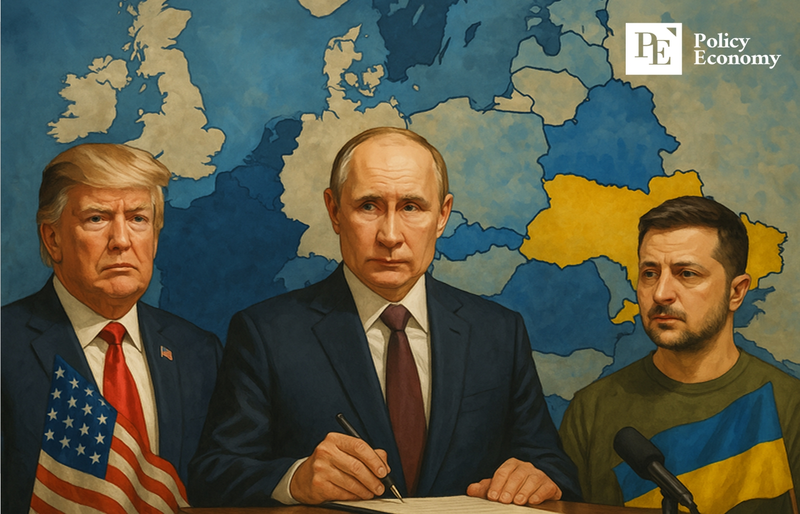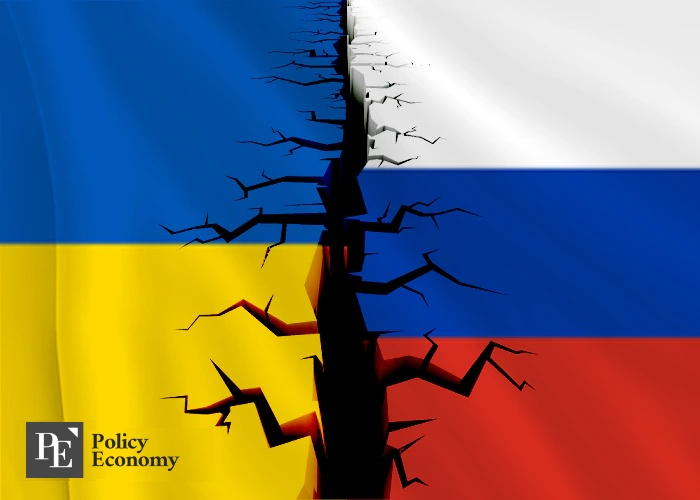Trump Warns of “Economic War” on Russia, Incomplete Compromise Inevitable Amid Ukraine’s Distrust in Security Guarantees
Input
Modified
Strong Sanctions Threatened Against Moscow
Ukraine Haunted by “Three Decades of Broken Promises”
Complex Interests Point to Imperfect Agreement as the Only Way Forward

President Donald Trump has warned that if peace talks between Russia and Ukraine collapse, Washington will not intervene militarily but will instead unleash sweeping economic sanctions. The message signals an intent to pressure Moscow through economic warfare rather than full-scale conflict. With deep mistrust in Western security guarantees firmly rooted in Ukraine, international observers argue that to end the grinding war of attrition, even an imperfect ceasefire must be accepted as the minimum form of peace.
Sanctions Viewed as More Cost-Effective Than Military Action
On August 26, speaking at a press briefing after a White House cabinet meeting, Trump said, “We want this war to end,” when asked about the conflict, adding that “a powerful set of sanctions is ready.” He stressed that “it will not be a world war, but an economic war,” though he stopped short of providing details about the measures.
He blamed both Moscow and Kyiv for stalled peace talks. Pointing to Russian President Vladimir Putin’s refusal to meet with Ukrainian President Volodymyr Zelensky on grounds of legitimacy, Trump accused both sides of posturing, saying, “They are all bluffing.” He added, “Zelensky is not entirely pure either. It takes two to tango,” suggesting Ukraine also bears responsibility.
Diplomatic circles interpreted the remarks as a sign that Washington is considering a strategy of minimizing costs by relying on economic pressure rather than direct military involvement. Analysts note that sanctions are a more efficient instrument than large-scale deployments that would entail heavy casualties and fiscal burdens. Earlier this month, on August 15, Trump met Putin in Alaska and suggested a bilateral summit between Putin and Zelensky would follow within two weeks. But he later backtracked, saying, “We do not know if it will actually happen,” underscoring the uncertainty.
Restoring Trust in Western Commitments at the Heart of Talks
For Kyiv, the deeper issue is whether any future ceasefire or peace treaty will carry real weight. At the core lies Ukraine’s long memory of three decades of broken promises by the West. Radio Free Europe reported that Ukraine has insisted that “sustainable peace is not about agreements on paper, but about enforceable security guarantees.”
This skepticism stems from Russia’s repeated violations of international law, including at least six agreements: the Alma-Ata Declaration (1991), the Budapest Memorandum (1994), the Treaty of Friendship and Cooperation (1997), the Border Treaty (2003), the Kharkiv Pact (2010), and the Minsk Accords (2014, 2015). Each collapse eroded confidence in Western commitments.
The Budapest Memorandum remains the most consequential. In the early 1990s, Ukraine inherited a massive nuclear arsenal after the Soviet Union’s dissolution but agreed to surrender its warheads in exchange for assurances of territorial integrity and security. The United States, the United Kingdom, and Russia signed, with France and China offering separate guarantees. Yet Moscow soon annexed Crimea and intervened militarily in Donbas, while the other signatories largely stood by.
Ukrainian-born historian Serhii Plokhy told NPR that “the annexation of Crimea was the first stage of the war,” noting that “Russia has repeatedly violated ceasefires and launched military operations ever since.” He warned that if Washington’s role diminishes, “the vacuum might be filled not by Europe, but by China.” His assessment reflects Ukraine’s growing willingness to explore alternatives, demanding not vague assurances but concrete, enforceable guarantees.

Perfect Settlement Beyond Reach
Meanwhile, Vice President J.D. Vance cautioned that even if peace talks advance, “no one will be fully satisfied.” Speaking to Fox News, he said, “Both Russia and Ukraine will inevitably complain,” adding that the U.S. objective is not a decisive victory or surrender but “a negotiation that stops the killing and creates relative peace.” Given the nature of the conflict, neither side can hope to secure all of its demands, leaving incomplete compromise as the only path forward.
The broader international community largely concurs. With neither Moscow nor Kyiv able to achieve total victory, and Western governments facing mounting political and financial strains, a deal that halts fighting—even if unsatisfactory—may be the only viable outcome. Analysts see such arrangements as likely to be accepted as “minimal peace.”
Reflecting this consensus, Vice President Vance argued that many diplomatic obstacles to ending the war have already been cleared. He credited Trump with reshaping the dynamics, saying, “Putin had been unwilling to engage with Zelensky at all, but President Trump has opened the possibility of dialogue between the two leaders.” He confirmed that efforts are under way to coordinate a three-way summit.





















